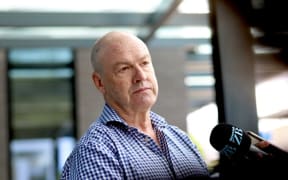FIFA Women's World Cup economic, social impact 'exceeded expectations' - report

FIFA Women's World Cup economic, social impact 'exceeded expectations' - report
A report by MBIE has declared this year's FIFA Women's World Cup "hugely successful across all key measures".
In an impact evaluation report, the Ministry of Business, Innovation and Employment said the event had surpassed its expectations with a $109.5 million return for New Zealand's economy.
"[It] really exceeded our expectations in terms of not only the economic impact but also how well New Zealanders engaged with the tournament," major events manager Kylie Hawker-Green said.
"Nearly 60 percent of Kiwis watched at least one match on TV or online."
Hawker-Green said the event was even more successful in person.
"We thought we might have 500,000 people going through the gates, [but] 740,000 tickets were issued," she said.
Almost half of those tickets were for matches at Auckland's Eden Park stadium.

MBIE major events Manager Kylie Hawker-Green. Photo: Supplied
"We attracted just under 27,000 international visitors who came to New Zealand specifically to attend the FIFA Women's World Cup."
Another 5000 tourists also attended the event but weren't specifically visiting for the World Cup.
Throughout the tournament visiting football fans spent a combined 312,008 nights in hotels across Auckland, Hamilton, Wellington and Dunedin, she said.
"That's a massive boost to accommodation, to retail, to hospitality over July and August."
Hawker-Green said she had always been confident the event would succeed, but expectations were lowered in early 2020.
"There obviously was a pandemic between [bidding for the event] and now, so we did consider that our expectations might not be realised," she admitted.
"But the report has shown that we generated to $109.5m in net economic benefit at a time, arguably, when our economy really needed that boost."

Tātaki Auckland Unlimited chief executive Nick Hill. Photo: RNZ / Marika Khabazi
A significant portion of that was in Auckland. Tātaki Auckland Unlimited said the event injected $87m in GDP into the region.
"[It] exceeded expectations on all fronts," chief executive Nick Hill said.
"The event showcased Auckland's position as a vibrant and dynamic region, but it also generated significant economic, social and cultural benefits."
For every dollar spent on the event, Hawker-Green said the New Zealand economy saw a $1.34 return.
Auckland's benefit-cost ratio was only slightly lower at $1.32 for every dollar.
Tātaki Auckland Unlimited project director Santha Brown said it had a big impact on Auckland's businesses, "particularly during what is typically a quieter period over July and August".
"[And] beyond the immediate economic benefits, the world cup has left a legacy for Auckland with over $18m being invested in upgraded lighting, pitches and facilities which will continue to benefit the community for many years to come."
Hawker-Green said the event had also given a boost to women's sport, with a 29 percent increase in viewership since July 2022.
"I hope we've generated a whole lot of new fans, I think there were many people who had probably never been to a women's football game until they walked through the gates," she said.
"The delivery of the FIFA Women's World Cup was very intentional from the government and built on our existing strategy to boost the visibility and therefore the validity of women's sport."
She said some of the event's success was thanks to a strong partnership with Australia, which co-hosted the event.
"It's not our first time co-hosting a World Cup event with Australia, and in this instance, we believe it worked incredibly well," she said.
"New Zealand was able to secure hosting the draw event and the playoff tournament, and effectively half of the actual tournament content, which exceeded what we thought we might secure in a co-hosting arrangement."
The Australian government has yet to release its own report, but Hawker-Green was confident it would be similar.
"I do know anecdotally that they were equally as positive about the tournament delivery and the levels of engagement they received," she said.

















































































































































































